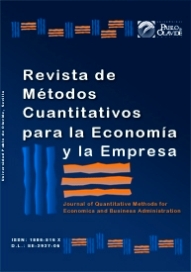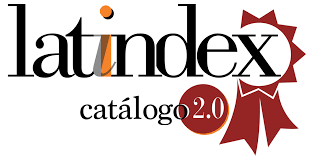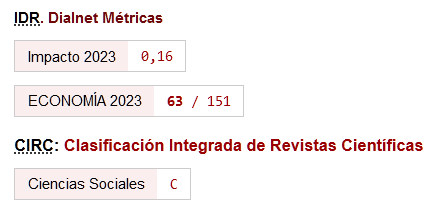Internal marketing as a key to organisational commitment: The mediation of work stress and happiness
DOI:
https://doi.org/10.46661/rev.metodoscuant.econ.empresa.10783Keywords:
Organisational Commitment, internal marketing , job stress, workplace happiness, employee retentionAbstract
The present research analyses the influence of internal marketing on organisational commitment, mediated by job stress and job satisfaction, in the context of the Great Resignation. Justified by the need to understand the interactions between these variables to improve employee well-being and retention in challenging business environments, this study aims to evaluate the direct relationship between internal marketing and organisational commitment and to determine the mediating role of job stress and job satisfaction. A quantitative methodology was used with a non-experimental, cross-sectional design, collecting data through an online questionnaire administered to a sample of 233 employees from various industries in Mexico, and the data were analysed using structural equation modelling (PLS-SEM). The main results indicate that internal marketing has a positive and significant relationship with organisational commitment (β=0.315, p=0.01) and job satisfaction (β=0.562, p=0.01), and a negative relationship with job stress (β=-0.317, p=0.01), without finding a significant relationship between job stress and organisational commitment (β=0.050, p=0.343). It is concluded that job satisfaction significantly mediates the relationship between internal marketing and organisational commitment, highlighting the importance of implementing internal marketing strategies and well-being programmes to strengthen organisational commitment and improve the work environment.
Downloads
References
Abdelmoteleb, S. A. (2019). A New Look at the Relationship Between Job Stress and Organizational Commitment: a Three-Wave Longitudinal Study. Journal of Business and Psychology, 34(3), 321-336. https://doi.org/10.1007/s10869-018-9543-z
Afsar, B., Al-Ghazali, B. M., Cheema, S., & Javed, F. (2020). Cultural intelligence and innovative work behavior: the role of work engagement and interpersonal trust. European Journal of Innovation Management, 24(4), 1082-1109. https://doi.org/10.1108/ejim-01-2020-0008
Alameeri, K., Alshurideh, M., Kurdi, B. A., & Salloum, S. A. (2020). The effect of work environment happiness on employee leadership. In Advances in intelligent systems and computing (pp. 668-680). https://doi.org/10.1007/978-3-030-58669-0_60
Almaslukh, F. M. O., Khalid, H., & Sahi, A. M. (2022). The Impact of Internal Marketing Practices on Employees' Job Satisfaction during the COVID-19 Pandemic: The Case of the Saudi Arabian Banking Sector. Sustainability, 14(15), 9301. https://doi.org/10.3390/su14159301
Aruldoss, A., Kowalski, K. B., & Parayitam, S. (2020). The relationship between quality of work life and work-life-balance mediating role of job stress, job satisfaction and job commitment: evidence from India. Journal of Advances in Management Research, 18(1), 36-62. https://doi.org/10.1108/jamr-05-2020-0082
Bakker, A. B., & De Vries, J. D. (2020). Job Demands-Resources theory and self-regulation: new explanations and remedies for job burnout. Anxiety Stress & Coping, 34(1), 1-21. https://doi.org/10.1080/10615806.2020.1797695
Bakker, A. B., & Demerouti, E. (2016). Job demands-resources theory: Taking stock and looking forward. Journal of Occupational Health Psychology, 22(3), 273-285. https://doi.org/10.1037/ocp0000056
Bashir, B., & Gani, A. (2020). Testing the effects of job satisfaction on organizational commitment. Journal of Management Development, 39(4), 525-542. https://doi.org/10.1108/JMD-07-2018-0210
Bulińska-Stangrecka, H., & Bagieńska, A. (2021). The role of employee relations in shaping job satisfaction as an element promoting positive mental health at work in the era of COVID-19. International Journal of Environmental Research and Public Health, 18(4), 1903. https://doi.org/10.3390/ijerph18041903
Chang, C. S., & Chang, H. C. (2008). Perceptions of internal marketing and organizational commitment by nurses. Journal Of Advanced Nursing, 65(1), 92-100. https://doi.org/10.1111/j.1365-2648.2008.04844.x
Charles-Leija, H., Castro, C. G., Toledo, M., & Ballesteros-Valdés, R. (2023). Meaningful work, happiness at work, and turnover intentions. International Journal of Environmental Research and Public Health/International Journal of Environmental Research and Public Health, 20(4), 3565. https://doi.org/10.3390/ijerph20043565
Chen, Q., Huang, R., Pak, K. Y., & Hou, B. (2020). Internal marketing, employee satisfaction and cultural congruence of Gulf airlines. Tourism Review, 76(6), 1214-1227. https://doi.org/10.1108/tr-06-2019-0266
Chiu, W., Won, D., & Bae, J. (2019). Internal marketing, organizational commitment, and job performance in sport and leisure services. Sport, Business and Management, 10(2), 105-123. https://doi.org/10.1108/SBM-09-2018-0066
Cohen, S., Kamarck, T., & Mermelstein, R. (1983). A Global Measure of Perceived Stress. Journal Of Health And Social Behavior, 24(4), 385.
https://doi.org/10.2307/2136404
Espasandín-Bustelo, F., Ganaza-Vargas, J., & Diaz-Carrion, R. (2020). Employee happiness and corporate social responsibility: the role of organizational culture. Employee Relations, 43(3), 609-629. https://doi.org/10.1108/er-07-2020-0343
Falk, R. F., & Miller, N. B. (1992). A primer for soft modeling (pp. 1-103). University of Akron Press.
Filimonau, V., Derqui, B., & Matute, J. (2020). The COVID-19 pandemic and organisational commitment of senior hotel managers. International Journal of Hospitality Management, 91, 102659. https://doi.org/10.1016/j.ijhm.2020.102659
Fornell, C., & Larcker, D. F. (1981). Evaluating Structural Equation Models with Unobservable Variables and Measurement Error. Journal of Marketing Research, 18(1), 39-50. https://doi.org/10.1177/002224378101800104
Galvan-Vela, E., Ravina-Ripoll, R., Salazar-Altamirano, M.A, & Sorzano Rodriguez, D. M. (2024). El trinomio compromiso, satisfacción y justicia organizacional en el binomio felicidad e intención de rotar. Retos, 14(28), 187-202. https://doi.org/10.17163/ret.n28.2024.01
Galván-Vela, E., Ruíz-Corrales, M., Ahumada-Tello, E., & Ravina-Ripoll, R. (2023). Eco-Innovation as a Positive and Happy Industry Externality: Evidence from Mexico. Sustainability, 15(8), 6417. https://doi.org/10.3390/su15086417
García-Buades, M. E., Peiró, J. M., Montañez-Juan, M. I., Kozusznik, M. W., & Ortiz-Bonnín, S. (2019). Happy-Productive Teams and Work Units: A Systematic review of the 'Happy-Productive Worker Thesis.' International Journal of Environmental Research and Public Health, 17(1), 69. https://doi.org/10.3390/ijerph17010069
Godin, I., Kittel, F., Coppieters, Y., & Siegrist, J. (2005). A prospective study of cumulative job stress in relation to mental health. BMC Public Health, 5(1), 67, 1-10. https://doi.org/10.1186/1471-2458-5-67
Grönroos, C. (2016). Service Management and marketing: Managing the Service Profit Logic. John Wiley & Sons.
Guerci, M., Hauff, S., & Gilardi, S. (2019). High performance work practices and their associations with health, happiness and relational well-being: are there any tradeoffs? The International Journal of Human Resource Management, 33(2), 329-359.https://doi.org/10.1080/09585192.2019.1695647
Gumasing, M. J. J., & Ilo, C. K. K. (2023). The impact of job satisfaction on creating a sustainable workplace: An empirical analysis of organizational commitment and lifestyle behavior. Sustainability, 15(13), 10283. https://doi.org/10.3390/su151310283
Guzeller, C. O., & Celiker, N. (2019). Examining the relationship between organizational commitment and turnover intention via a meta-analysis. International Journal of Culture, Tourism and Hospitality Research, 14(1), 102-120. https://doi.org/10.1108/ijcthr-05-2019-0094
Hair, J., & Alamer, A. (2022). Partial Least Squares Structural Equation Modeling (PLS-SEM) in second language and education research: Guidelines using an applied example. Research Methods in Applied Linguistics, 1(3), 100027. https://doi.org/10.1016/j.rmal.2022.100027
Hair, J. F., Jr, Hult, G. T. M., Ringle, C. M., Sarstedt, M., Apraiz, J. C., Carrión, G. a. C., & Roldán, J. L. (2019). Manual de Partial Least Squares Structural Equation Modeling (PLS-SEM) (Segunda Edición). https://doi.org/10.3926/oss.37
Hakim, L., & Hidayat, A. S. (2018). The effect of job stress and job satisfaction on organizational commitment. Indonesian Journal of Business and Economics, 1(1), 110-119. https://doi.org/10.25134/ijbe.v1i1.1363
Henseler, J., Ringle, C. M., & Sarstedt, M. (2014). A new criterion for assessing discriminant validity in variance-based structural equation modeling. Journal of the Academy of Marketing Science, 43(1), 115-135. https://doi.org/10.1007/s11747-014-0403-8
Hernández-Arteaga, L. G., Salazar-Altamirano, M. A., Martínez-Arvizu, O. J., & Del Lourdes Arias Gómez, M. (2025). The CSR, Satisfaction, and commitment triad: its strategic effect on perceived performance. Ámbitos Revista Internacional De Comunicación, 67, 243-264. https://doi.org/10.12795/ambitos.2025.i67.13
Herrera, J., & De Las Heras-Rosas, C. (2021). The organizational commitment in the company and its relationship with the psychological contract. Frontiers in Psychology, 11, 609211, 1-14. https://doi.org/10.3389/fpsyg.2020.609211
Hong, Y., Zhang, Y., Xue, P., Fang, X., Zhou, L., Wei, F., Lou, X., & Zou, H. (2022). The influence of long working hours, occupational stress, and well-being on depression among couriers in Zhejiang, China. Frontiers in Psychology, 13, 928928, 1-12. https://doi.org/10.3389/fpsyg.2022.928928
Hu, L., & Bentler, P. M. (1999). Cutoff criteria for fit indexes in covariance structure analysis: Conventional criteria versus new alternatives. Structural Equation Modeling, 6(1), 1-55. https://doi.org/10.1080/10705519909540118
Jaswal, N., Sharma, D., Bhardwaj, B., & Kraus, S. (2024). Promoting well-being through happiness at work: a systematic literature review and future research agenda. Management Decision, 62(13), 332-369. https://doi.org/10.1108/md-08-2023-1492
Jou, J., Chou, C., & Fu, F. (2008). Development of an instrument to measure internal marketing concept. Journal of Applied Management and Entrepreneurship, 13(3), 66-85. https://www.proquest.com/openview/883e8d04d4ebe2d0265f2875072695dd/1?pq-origsite=gscholar&cbl=25565
Joung, H., Goh, B. K., Huffman, L., Yuan, J. J., & Surles, J. (2021). Investigating relationships between internal marketing practices and employee organizational commitment in the foodservice industry. International Journal of Contemporary Hospitality Management, 27(7), 1618-1640. https://doi.org/10.1108/IJCHM-05-2014-0269
Karasek, R. A., & Theorell, T. (1990). Healthy work: Stress, productivity, and the reconstruction of working life (pp. 121-128). New York: Basic Books.
Kaur, P., Malhotra, K., & Sharma, S. K. (2020). Moderation-mediation framework connecting internal branding, affective commitment, employee engagement and job satisfaction: an empirical study of BPO employees in Indian context. Asia-Pacific Journal of Business Administration, 12(3/4), 327-348. https://doi.org/10.1108/apjba-10-2019-0217
Kim, J., & Jung, H. (2022). The effect of employee competency and organizational culture on employees' perceived stress for better workplace. International Journal of Environmental Research and Public Health/International Journal of Environmental Research and Public Health, 19(8), 4428. https://doi.org/10.3390/ijerph19084428
Kumar, M., Saini, A., & Jeet, K. (2024). Sustaining mental health amidst high-pressure job scenarios: a narrative review. International Journal of Community Medicine and Public Health, 11(8), 3319-3325. https://doi.org/10.18203/2394-6040.ijcmph20242197
Kun, A., & Gadanecz, P. (2019). Workplace happiness, well-being and their relationship with psychological capital: A study of Hungarian Teachers. Current Psychology, 41(1), 185-199. https://doi.org/10.1007/s12144-019-00550-0
Li, N., Zhang, L., Li, X., & Lu, Q. (2020). The influence of operating room nurses' job stress on burnout and organizational commitment: The moderating effect of over‐commitment. Journal of Advanced Nursing, 77(4), 1772-1782. https://doi.org/10.1111/jan.14725
Lubbe, S.M. (2013), "Elements of internal marketing as predictors of employee satisfaction", Unpublished dissertation, University of Pretoria.
Lyubomirsky, S., & Lepper, H. S. (1999). A measure of subjective happiness: Preliminary reliability and construct validation. Social Indicators Research, 46(2), 137-155. https://doi.org/10.1023/a:1006824100041
Mansourlakouraj, A., Abdollahi, D., & Rasouli, I. (2019). Effect of subjective well-being and quality of work life on job commitment of hospital staff. Iranian Journal of War and Public Health, 11(3), 169-174. https://doi.org/10.29252/ijwph.11.3.169
Martínez-Arvizu, O. J., Salazar-Altamirano, M. A., Galván-Vela, E., & Ravina-Ripoll, R. (2025). Happiness management e intención de rotar: diferencias sectoriales en los efectos de mediación del estrés. Revista De Estudios Empresariales, e9542.https://doi.org/10.17561/ree.n2.2025.9542
Martínez-Falcó, J., Sánchez-García, E., Marco-Lajara, B., & Millán-Tudela, L. A. (2024a). Enhancing employee wellbeing and happiness management in the wine industry: Unveiling the role of green human resource management. BMC Psychology, 12(1), 66, 1-13. https://doi.org/10.1186/s40359-024-01703-y
Martínez-Falcó, J., Sánchez-García, E., Marco-Lajara, B., & Millán-Tudela, L. A. (2024). Enhancing employee wellbeing and happiness management in the wine industry: Unveiling the role of green human resource management. BMC Psychology, 12(1), 66, 1-12.
https://doi.org/10.1186/s40359-024-01703-y
Mercader, V., Galván-Vela, E., Salazar-Altamirano, M. A., & Ravina-Ripoll, R. (2025). Business ethics, corporate social responsibility and fostering innovation as predictors of employee happiness. Suma De Negocios, 16(34), 92-103.
https://doi.org/10.14349/sumneg/2025.V16.N34.A9
Meyer, J. P., & Allen, N. J. (1997). Commitment in the workplace: Theory, Research, and Application. SAGE.https://doi.org/10.4135/9781452231556
Morán, R. C. D., Soto, J. M. S., Gómez, H. E. L., Camus, F. C. E., Quispe, J. F. P., Llaja, L. C., Tavera, Z. R. D., & Wong, F. M. R. (2023). Work stress as a Consequence of the COVID-19 Pandemic: A Systematic review. Sustainability, 15(6), 4701.https://doi.org/10.3390/su15064701
Nemteanu, M., & Dabija, D. (2021). The Influence of Internal Marketing and Job Satisfaction on Task Performance and Counterproductive Work Behavior in an Emerging Market during the COVID-19 Pandemic. International Journal of Environmental Research and Public Health, 18(7), 3670. https://doi.org/10.3390/ijerph18073670
O'brien, R. M. (2007). A caution regarding rules of thumb for variance inflation factors. Quality and Quantity, 41(5), 673-690. https://doi.org/10.1007/s11135-006-9018-6
Parker, D. F., & DeCotiis, T. A. (1983). Organizational determinants of job stress. Organizational Behavior and Human Performance, 32(2), 160-177. https://doi.org/10.1016/0030-5073(83)90145-9
Pelealu, N. J. J., Rares, N. J. J., & Lotulung, N. L. J. H. (2023). The effect of job stress, job satisfaction and organizational commitment on employee performance of cv. calantha permai in manado. Santhet (Jurnal Sejarah Pendidikan Dan Humaniora), 7(2), 651-660.
https://doi.org/10.36526/santhet.v7i2.3091
Qiu, J., Boukis, A., & Storey, C. (2021). Internal Marketing: A Systematic Review. Journal of Marketing Theory and Practice, 30(1), 53-67.
https://doi.org/10.1080/10696679.2021.1886588
Ravina-Ripoll, R., Díaz-García, G. A., Ahumada-Tello, E., & Galván-Vela, E. (2024). Emotional wage, happiness at work and organisational justice as triggers for happiness management. Journal of Management Development, 43(2), 236-252.
https://doi.org/10.1108/JMD-02-2023-0046
Ravina-Ripoll, R., Nunez-Barriopedro, E., Almorza-Gomar, D., & Tobar-Pesantez, L. (2021). Happiness Management: A culture to explore from brand orientation as a sign of responsible and sustainable production. Frontiers in Psychology, 12, 727845, 1-10.
https://doi.org/10.3389/fpsyg.2021.727845
Salas-Vallina, A., & Alegre, J. (2018). Happiness at work: Developing a shorter measure. Journal of Management & Organization, 27(3), 460-480. https://doi.org/10.1017/jmo.2018.24
Salazar-Altamirano, M. A., Galván-Vela, E., Ravina-Ripoll, R., & Bello-Campuzano, M. R. (2024a). Exploring job satisfaction in fitness franchises: A study from a human talent perspective. BMC Psychology, 12(1), 128, 1-11. https://doi.org/10.1186/s40359-024-01855-x
Salazar-Altamirano, M. A., Martínez-Arvizu, O. J., & Sánchez, D. G. (2024b). "Integration of internal marketing to optimise workplace happiness and reduce turnover intentions in the era of Industry 5.0". IROCAMM-International Review of Communication and Marketing Mix, 2(7), 26-50. https://doi.org/10.12795/IROCAMM.2024.v07.i02.02
Seligman, M. (2018). PERMA and the building blocks of well-being. The Journal of Positive Psychology, 13(4), 333-335.
https://doi.org/10.1080/17439760.2018.1437466
Sigit, N. H., & Muafi, M. (2022). The influence of internal marketing and organizational commitment on employee performance mediated by psychological capital. International Journal of Research in Business and Social Science (2147-4478), 11(8), 177-190.
https://doi.org/10.20525/ijrbs.v11i8.2179
Singh, A., & Banerji, R. (2022). Happiness at work, organization citizenship behaviour and workplace diversity: a study on Indian private sector bank employees. Industrial and Commercial Training, 54(3), 460-475. https://doi.org/10.1108/ICT-05-2021-0037
Tanhaei, M. H., Isfahani, A. N., & Ahmadabadi, M. N. (2013). Investigating the effect of internal marketing on employee happiness in University of Isfahan. International Journal of Academic Research in Business and Social Sciences, 3(9), 466-473.
https://doi.org/10.6007/IJARBSS/v3-i9/216
Uludag, O., Oluwajana, D., & Ekanem, E. (2023). Congruent internal marketing efforts to reduce turnover intentions among restaurant employees in the midst of COVID-19. Kybernetes, 52(7), 2347-2370. https://doi.org/10.1108/K-03-2022-0478
Wang, P., Chu, P., Wang, J., Pan, R., Sun, Y., Yan, M., Jiao, L., Zhan, X., & Zhang, D. (2020). Association between job stress and organizational commitment in three types of Chinese university teachers: Mediating effects of job burnout and job satisfaction. Frontiers in Psychology, 11, 576768, 1-10. https://doi.org/10.3389/fpsyg.2020.576768
Zegeye, Y. (2019). The effect of internal marketing on employee job satisfaction of Lion International Bank. Journal of Marketing and Consumer Research, 63, 8-17. https://doi.org/10.7176/JMCR/63-02
Published
How to Cite
Issue
Section
License
Copyright (c) 2024 Mario Alberto Salazar-Altamirano, Orlando Josué Martínez-Arvizu, David Gómez Sánchez, Lorena Gabriela Hernández-Arteaga

This work is licensed under a Creative Commons Attribution-ShareAlike 4.0 International License.
Submission of manuscripts implies that the work described has not been published before (except in the form of an abstract or as part of thesis), that it is not under consideration for publication elsewhere and that, in case of acceptance, the authors agree to automatic transfer of the copyright to the Journal for its publication and dissemination. Authors retain the authors' right to use and share the article according to a personal or instutional use or scholarly sharing purposes; in addition, they retain patent, trademark and other intellectual property rights (including research data).
All the articles are published in the Journal under the Creative Commons license CC-BY-SA (Attribution-ShareAlike). It is allowed a commercial use of the work (always including the author attribution) and other derivative works, which must be released under the same license as the original work.
Up to Volume 21, this Journal has been licensing the articles under the Creative Commons license CC-BY-SA 3.0 ES. Starting from Volume 22, the Creative Commons license CC-BY-SA 4.0 is used.










